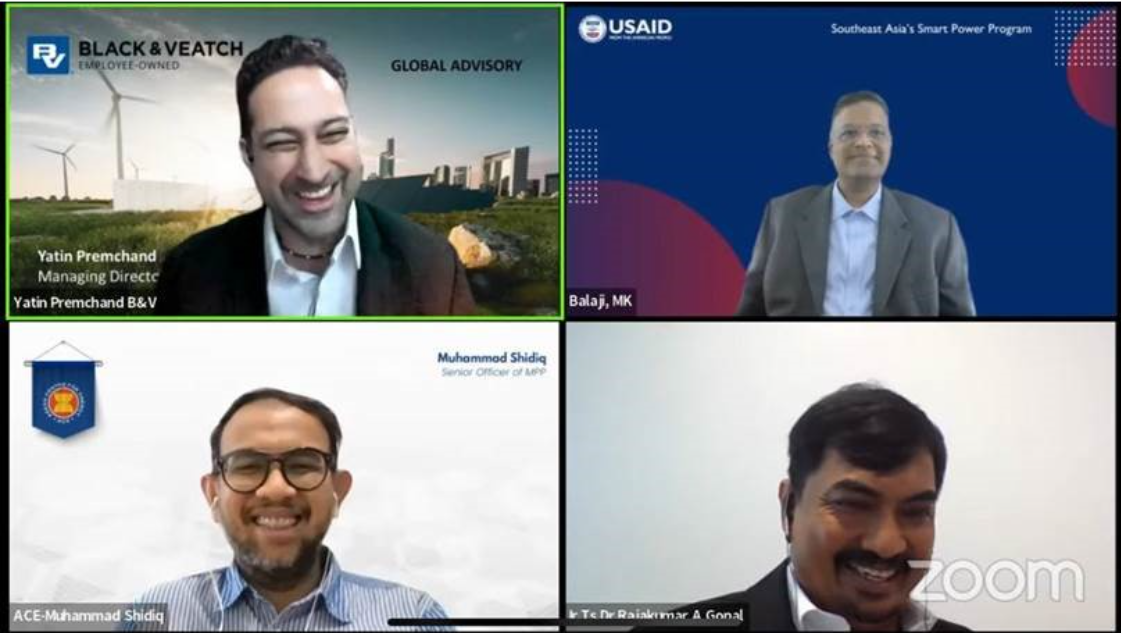i
i
Online, 22 June 2023
ACCEPT II has been invited by Enlit to speak at their webinar series on Decarbonization technologies for a greener and sustainable ASEAN energy future held on 22 June 2023.
A 40-minute webinar has been moderated by Yatin Premchand, Managing Director for Strategic Growth – Global Advisory at Black & Veatch. Three speakers who are Ir. Ts. Dr. Rajakumar A Gopal, Vice President I Group Business and Project Development at Edra Power Holdings Sdn Bhd; M.K. Balaji, Director Advanced Energy System at USAID SEA Smart Power Program; and Muhammad Shidiq, Senior Research Analyst of ASEAN Climate Change and Energy Project (ACCEPT) at ASEAN Centre for Energy (ACE). The webinar entitles “Maximizing the Hydrogen Supply Chain to Support Low-Carbon Energy System” has discussed key considerations for developing an end-to-end hydrogen strategy, and elaborated challenges and opportunities in transporting, storing and distribution of low-carbon hydrogen/ammonia.
Yatin started by introducing the event, organizer, and speakers’ background. He also shortly updates the global development of hydrogen where developed countries is pacing the development and implementation of hydrogen in particular green hydrogen. Balaji highlighted that large number of projects, investment and development of world economies has helped the push into hydrogen-based economies. This may become opportunities to support hydrogen development in the region ranging from technology availability, knowledge transfer, and financing aspect. From private sector and operator, Rajakumar highlighted that hydrogen is on transitioning phase in the region since it is a new and emerging technologies and may become an opportunity, but risks or challenges may be there on implementing this emerging technology.
Shidiq started by delivering information on ASEAN Plan of Action on Energy Cooperation (APAEC) phase II:2021-2025 mentioning that despite deploying large-scale renewable energy systems, accommodating higher shares of RE in the APG and increasing RE investments, hydrogen is an emerging energy technologies that could help ASEAN on achieving its aspirational targets of 23% share of RE in Total Primary Energy Supply and 35% share of RE in ASEAN installed power capacity by 2025 as mentioned in APAEC phase II document. In grid connectivity, wind, solar farms, and other flexible resources such as hydrogen as an emerging technology will be increasingly connected to the electricity grid networks and significant investments in these networks will be essential in the coming years. Seeing the growth of new and emerging energy technologies including hydrogen, the next APAEC document phase III: 2026 – 2030 may also highlight the importance of hydrogen to be further developed for ASEAN.

Figure. The moderator (Yatin Premchand) and the speakers (clockwise – Balaji MK, Dr Rajakumar A Gopal and Muhammad Shidiq) during the online event.
The three speakers highlighted the main challenges of hydrogen for ASEAN which may include but not limited to lack of hydrogen infrastructure such as pipeline, liquefaction plants, ammonia cracking and LOHC dehydrogenation solutions; the high-cost delivery of hydrogen; and the lack of market due to the high price of hydrogen and replacement of hydrogen. In addition, the public view related to safety concerns such as gas leakage during transportation or gas explosion on hydrogen fuel cell electric vehicle (HFCEV) is risk that ASEAN may face during its hydrogen development. Hydrogen experts should also be further created and increased to ensure the development of hydrogen in the region could be implemented faster and minimize the risks.
Seeing the challenges or the risks, Shidiq mentioned that based on current analysis of the ASEAN Centre for Energy, ASEAN should undertake several actions including:
Detailed information on ACCEPT II can be found at https://accept.aseanenergy.org/.
ACCEPT II welcomes any collaboration, please feel free to contact us at [email protected]